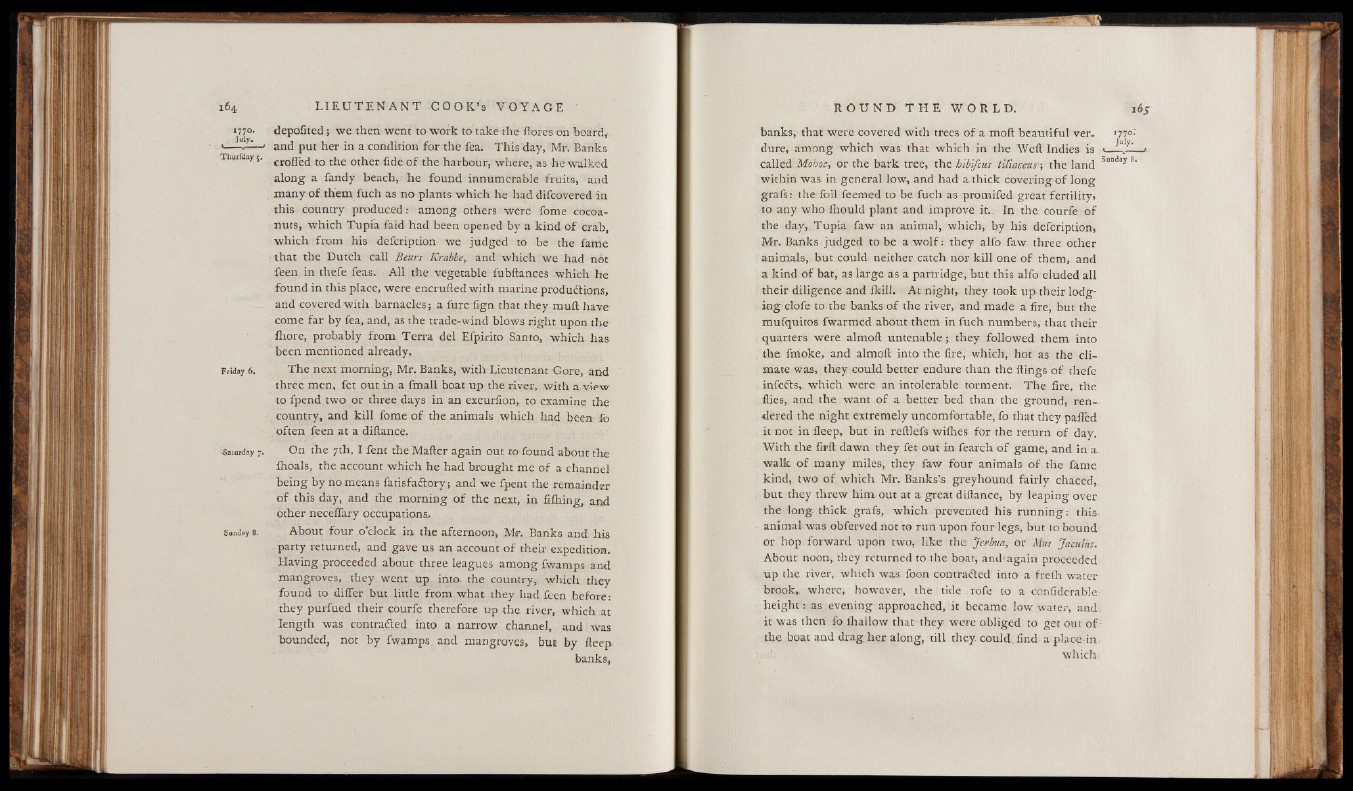
164 L I EUT ENANT C O O K ’ s V O Y A G E
1770.
July.
Thurfday 5.
Friday 6,
•Saturday 7.
Sunday 3.
depofited; we then went to work to take the ftores on board,
and put her in a condition for the fea. This day, Mr. Banks
crofled to the other fide of the harbour, where, as he walked
along a fandy beach, he found innumerable fruits, and
many o f them fuch as no plants which he had difcovered in
this country produced: among others were fome cocoa-
nuts, which Tupia faid had been opened by a kind of crab,
which from his defcription we judged to be the fame
: that the Dutch call Beurs Krabbe, and which we had not
feen in thefe feas. All the vegetable fubftances which he
found in this place, were encrufted with marine productions,
and covered with barnacles; a fure fign that they mull have
come far by fea, and, as the trade-wind blows right upon the
fhore, probably from Terra del Efpirito Santo, which has
been mentioned already.
The next morning, Mr. Banks, with Lieutenant Gore, and
three men, fet out in a fmall boat up the river, with a view
to fpend two or three days in an excurfion, to examine the
. country, and kill fome of the animals which had been fo
often feen at a diftance.
On the 7th, I fent the Mailer again out to found about the
Ihoals, the account which he had brought me of a channel
being by no means fatisfadlory; and we fpent the remainder
of this day, and the morning of the next, in filhing, and
other neceflary occupations.
About four o’clock in the afternoon, Mr. Banks and his
party returned, and gave us an account of their expedition.
Having proceeded about three leagues among fwamps and
mangroves, they went up into, the country, which they
found to differ but little from what they had feen before:
they purfued their courfe therefore up the river, which at
length was contracted into a narrow channel, and was
bounded, not by fwamps and mangroves, but by fleep
banks,
banks, that were covered with trees of a moll beautiful ver- *77°*
dure, among which was that which in the Weft Indies is > _
called Mohoe, or the bark tree, the hibifcus tiliaceus•; the land Suntla^ 8'
within was in general low, and had a thick coveringof long
grafs: the foil feemed to be fuch as promifed, great fertility,
to any who fhould plant and improve it,. In the courfe of
the day, Tupia faw an animal, which, by his defcription,
Mr. Banks judged to be a wolf : they alfo faw three other
animals, but could neither catch nor kill one of them, and
a kind of bat, as large as a partridge, but this alfo eluded all
their diligence and flail. At night, they took up their lodging
clofe to. the banks of the river, and made a fire, but the
mufquitos fwarmed about them in fuch numbers, that their
quarters were almoft untenable ; they followed them into
the fmoke, and almoft into the fire, which, hot as the climate
was, they could better endure than the flings of thefe
infects, which were an intolerable torment. The fire, the
flies, and the want of a better bed than the ground, rendered
the night extremely uncomfortable, fo that they palled
it not in fleep, but in reftlefs wilhes for the return of day.
With the firft dawn they fet out in fearch of game, and in a
walk of many miles; they faw four animals of the fame
kind, two of which Mr. Banks’s greyhound fairly ehaced,,
but they threw him out at a great diftance, by leaping over
the long thick grafs, which prevented his running : this
animal was obferved not to run upon four legs, but to bound
or hop forward upon two, like the Jerbua, or Mut Jaculns.
About noon, they returned to the boat, and’ again proceeded
up the river, which was foon contradled’ into a frefh water
brook, where, however, the tide rofe to a confiderable-
height: as evening approached, it became low water, and.
it was then fo fhallow that they were obliged to get out of
the boat and drag her, along, till they, could, find a place in
which.